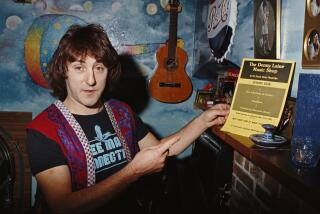Singer’s Audience Grows Younger
- Share via
SAN DIEGO — From a veranda overlooking San Diego Bay, the sweet, clear voice of little Tiffany Vien-Sanchez floated through the warm summer air.
“Up in heaven many years ago, God was making shoulders, knees and toes. He put them all together and painted them with love. And he made me what my mom is thankful of. He created me, the way I look, using all the pieces that he took. . . .”
The brown-haired girl in the blue cotton dress paused ever so briefly.
“Hey, she’s got good breath!” said popular singer Frankie Laine, who stood in the small audience gathered in his backyard. “She had a little jazz thing going on. It’s marvelous.”
Seven-year-old Tiffany was among six children from the Salvation Army music program who visited Laine recently for a voice and music lesson. The big-voiced singer was one of the most popular entertainers in the 1950s, recording such signature songs as “That’s My Desire,” “Mule Train” and “Jezebel.” He also sang the theme to the “Rawhide” television show, which ran from 1959 to 1966.
The 84-year-old singer became associated with the Salvation Army several years ago when he performed in a benefit to collect shoes for the homeless. Later, community relations director Victor Pinzon asked him to lend his expertise to the fledgling musicians.
“The value of music is incalculable,” Laine said during a break in the children’s second visit to his home. “It’s so hard to define what music can do to you, what a song can do for you. It can’t hurt to be exposed to music. It can only help.”
The children come from low-income families, many with only one parent at home. The used trumpets they carried into Laine’s house and played on his veranda were donated. They could not afford instruments or music lessons otherwise.
“He has such a natural love of young people,” said Don Read, music department coordinator for the Salvation Army. “He crosses over several generations.”
“It’s pretty good,” said budding drummer Kyle Richardson, 13, referring to lessons with the singer, who likely entertained his grandparents.
Laine has helped draw attention to the Salvation Army’s used-instrument program, taping a radio promo broadcast on jazz and classical stations in San Diego, Pinzon said. He hopes to get it played in Chicago, New York and other urban markets where the need for used instruments is acute.
When people hear about the program, Pinzon said, they will dust off those old trumpets, horns and flutes tucked away in their closets and attics.
Later, Laine led the children into his cozy music room overlooking the harbor. On the walls between the picture-book windows hung gold records (he earned more than 20), oil paintings and a favorite photograph of Laine and his late wife, the 1930s movie actress Nan Grey.
Perched on the edge of an easy chair permanently stationed at his stereo, Laine played two cuts from his newest CD, which will be released this fall.
He cocked his head forward, his live voice accompanying his recorded one, his right foot tapping the carpet where the children sat. They listened intently as Laine’s arranger and conductor, Benny Hollman, provided a running commentary on the musical structure to “The Song of India” and “Until Now.”
Laine’s white beard framed his serene face as he was swept away to another place, perhaps some smoky lounge in Chicago or a secluded beach with his arms wrapped around Nan.
His eyes behind his glasses were shut tight. “No one heard my song until now. . . .”
More to Read
The biggest entertainment stories
Get our big stories about Hollywood, film, television, music, arts, culture and more right in your inbox as soon as they publish.
You may occasionally receive promotional content from the Los Angeles Times.









